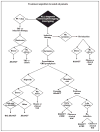Allogeneic hematopoietic cell transplantation for acute lymphoblastic leukemia in adults
- PMID: 22234252
- PMCID: PMC3520484
- DOI: 10.1097/CCO.0b013e32834f5c41
Allogeneic hematopoietic cell transplantation for acute lymphoblastic leukemia in adults
Abstract
Purpose of review: Acute lymphoblastic leukemia (ALL) is a heterogeneous disease, for which treatment guidelines are still evolving. Allogeneic hematopoietic cell transplantation (allo-HCT) is a potentially curative therapeutic modality for ALL, and this review describes the recent studies and current practice patterns concerning the who, when, and how of allo-HCT in the management of ALL.
Recent findings: Allogeneic stem cell transplantation is the treatment of choice for patients with ALL after first relapse and is also recommended for high-risk patients in first complete remission (CR1). Minimal residual disease evaluation and monitoring is developing as an important prognostic factor and could guide physicians in determining which patients, especially those with standard risk, might require transplant. Tyrosine kinase inhibitor (TKI) therapy allows a much higher proportion of Philadelphia-chromosome-positive ALL patients to attain remission and proceed to transplant with improved results; posttransplant TKI maintenance therapy may also provide survival benefit. Reduced-intensity conditioning regimens are a reasonable alternative for patients who would otherwise be ineligible for transplant because of age or comorbidity.
Summary: For patients with high-risk features, there is general agreement that allo-HCT in CR1 is a potentially curative option; however, there is no consensus on early transplant for standard-risk patients.
Conflict of interest statement
The authors declare no conflicts of interest. The authors are supported by NIH Grant #P30 CA033572-30.
Figures
References
-
- SEER incidence and NCHS mortality statistics [database on the Internet] 2011 Available from: http://seer.cancer.gov/statfacts/html/alyl.html#survival.
-
- Nishiwaki S, Miyamura K. Allogeneic Stem Cell Transplantation For Adult Philadelphia Chromosome-Negative Acute Lymphoblastic Leukemia. Leuk Lymphoma. 2011 Aug 19; - PubMed
-
- Wetzler M, Dodge RK, Mrozek K, et al. Prospective karyotype analysis in adult acute lymphoblastic leukemia: the cancer and leukemia Group B experience. Blood. 1999 Jun 1;93(11):3983–93. - PubMed
-
- Moorman AV, Harrison CJ, Buck GA, et al. Karyotype is an independent prognostic factor in adult acute lymphoblastic leukemia (ALL): analysis of cytogenetic data from patients treated on the Medical Research Council (MRC) UKALLXII/Eastern Cooperative Oncology Group (ECOG) 2993 trial. Blood. 2007 Apr 15;109(8):3189–97. - PubMed
Publication types
MeSH terms
Substances
Grants and funding
LinkOut - more resources
Full Text Sources
Research Materials


